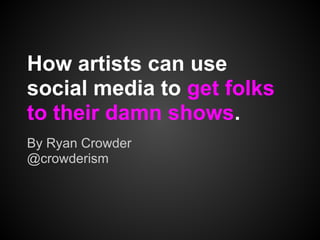How artists can use social media to get folks to their damn shows
- 1. How artists can use social media to get folks to their damn shows. By Ryan Crowder @crowderism
- 2. Why Social? THEN Ō¢Ā You searched out events Ō¢Ā Limited number of publications, people read the same stuff Ō¢Ā Trusted sources had years of history behind them Ō¢Ā Event listings helped keep things organized Ō¢Ā Personal / prof. separation Ō¢Ā Marketing was about info Ō¢Ā The megaphone worked if you were organized
- 3. Why Social? NOW ŌŚÅ Traditional media outlets struggle ŌŚÅ No one reads or watches the same thing in a big way ŌŚÅ Now we bond over things/topics ŌŚÅ Trusted curators are the ones now heard ŌŚÅ Events come through your network ŌŚÅ Build & own your audience or die ŌŚÅ Co-promotion, networks and partnerships ŌŚÅ Mobile phones are like woah ŌŚÅ Art needs to be visible on the internet to get attention
- 4. Social Networks for Artists ŌŚÅ General updates, community building, event listings, interactions ŌŚÅ Visual storytelling, artistic sense, creativity ŌŚÅ Most popular(and expensive), visual storytelling, messaging, groups, event listings, alerts ŌŚÅ Visual storytelling, previews, long-term ŌŚÅ Easy to read/watch/listen and share, specific curated content
- 5. It's totally essential to invest in social media before you need it.
- 6. Starting Early 1. Begin building an audience now 2. Share quality content consistently a. i.e. Inspirations, things that make you think or laugh, support fellow artists, news and important info b. Be yourself. Have a sense of humor. Be honest. c. Be trustworthy: Build a rep as a solid curator 3. Interact with others, stay connected a. Click "like" and share (you like it, so do others) 4. Avoid being too promotional a. Remember its not all about you b. Mix it up; offer value by spreading word of what you are doing; entertain and enlighten
- 7. Facebook Event Page Success Helpful things to have ŌŚÅ Memorable eye-catching images Ō¢Ā Main image and additional images ŌŚÅ Additional content (links, readings, etc.) ŌŚÅ Video/s (no more than 1 min) ŌŚÅ Colleagues to help with posting Important steps ŌŚÅ Invite anyone as appropriate ŌŚÅ Ask performers to invite contacts ŌŚÅ Post content every couple days ŌŚÅ Step up posting frequency as the show approaches, stay on topic ŌŚÅ Don't do it all yourself, ask others to help Translation: ask fans to share (privately)
- 8. Facebook tips ŌŚÅ Use your personal profile; using a page costs money, unless you pay, roughly 10% of fans will see content ŌŚÅ Got a page? It's ok. Make sure to use Facebook as the page from time to time to get on people's radar. ŌŚÅ Keep it visual. Instead of a link, post an image and put the link in the comments ŌŚÅ Try not to exceed a couple posts each day ŌŚÅ Change it up; Don't post the same thing multiple times, see what people respond to and adapt ŌŚÅ As your show approaches and when you have quality content, step up your interactions on other people's pages. Nothing brings support like contributing yourself
- 9. Good content vs. bad content Good Bad r Rehearsal is going so great for the show we are in there every day and it is really hard but the sun is shining and I am thiankful for the opprotunity to do this show. Buy tickets! There is a part in act 1 that is confusinc and Sharon is totally working it but it takes a lot of work to Who knew a crown focus and produce the best results. Don't forget could weigh so much? to buy tickets! Keep it short. Keep it visual. Keep it entertaining - evocative - emotional - i(e)nformative
- 10. The other networks Instagram Tumblr ŌŚÅ Clearly articulate your ŌŚÅ Keep it simple, focus on a theme. perspective with visuals Baking musical? Babies with ŌŚÅ Participate: Interact and bread Tumblr! like other content ŌŚÅ Liking other's content brings return visits and subscriptions Youtube ŌŚÅ Sex and GIFs work very well here ŌŚÅ Unless you plan to post Twitter regularly, use this to host ŌŚÅ Interact, interact, interact, your videos, make them RT, RT, RT easily searchable ŌŚÅ You can repost here, just don't be obnoxious WARNING: Don't spread ŌŚÅ Tell stories across multiple tweets yourself too thin.
- 11. Integrating the networks In other words, how do you do all this!? ŌŚÅ Create a posting calendar & hold yourself to it ŌŚŗ 3 weeks out - post a rehearsal image, links to tickets ŌŚŗ 2 weeks out - share a sneak peek of the set, hint the themes/content ŌŚŗ 1 week out - share daily photos of props, costumes, etc. ŌŚŗ 3 days out - share a 30 sec. video of you being excited ŌŚŗ Day-of morning - steaming cup of spilled coffee ŌŚŗ Day-of evening - make it easy for audience to share ŌŚÅ Schedule content ŌŚŗ HootSuite/Tweetdeck - text-based Twitter and Facebook posts ŌŚŗ Tumblr scheduler, pages can use Facebook scheduler ŌŚÅ Do not sync social profiles ŌŚŗ No one responds well to auto-posting from Facebook to Twitter
- 12. The Privacy Concern Develop level of comfort with public sharing You sacrifice privacy for connection Instead, set privacy controls ŌŚÅ share some with all, all with some Facebook lists ŌŚÅ Create list of people you feel comfortable sharing everything ŌŚÅ When you post, decide whether to the public or just to the list Twitter @replies vs. public updates Instagram private vs. public













